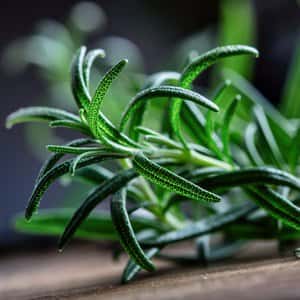
The parasitic arthropods we call lice (Pediculus humanus capitis) have always been persistent. Over the past few decades, they have also become resistant to some of the insecticides that we commonly use to eradicate them. As a result, people have turned more frequently to home remedies for relief (Journal of Pediatric Nursing, Dec. 2004). Olive oil has long been a popular treatment, although dermatologists are skeptical of its effectiveness. Could rosemary oil also help?
Can You Suffocate Lice?
Q. About ten years ago a child passed onto me a bad case of insecticide-resistant lice. I tried using the insecticide products three or four times, to no avail.
I then found on the Internet a product which consisted of olive oil and a little rosemary oil. The lice were all killed in one application. It was easy to wash out the product, and my hair smelled great. I can no longer find this product on the Internet, but I certainly recommend trying olive oil with rosemary.
A. Oils may work against lice by smothering them. That is the basis for a number of home remedies, including Vaseline petroleum jelly. A meta-analysis of 17 trials compared such suffocation techniques to standard neurotoxic lice treatments (Pediatric Dermatology, online Oct. 22, 2019). The investigators found that occlusive treatments such as petroleum jelly or silicone oils are just as effective as neurotoxic pesticides. In addition, the occlusive treatments had few side effects. (Parents who have tried it can attest, however, that washing Vaseline out of a child’s hair can be an enormous challenge.)
Will Rosemary Oil Help?
Adding rosemary oil to olive oil sounds innovative. There is even some research to support such an approach. Scientists in Turkey found that rosemary oil (Rosmarinus officinalis) is more effective for killing lice than other herbs traditionally used for this purpose (Turkiye Parazitolojii Dergisi, Dec. 2017). The components of the essential oil of rosemary have antiparasitic and antimicrobial activity (Future Science OA, April 2018). Earlier research had identified tea tree oil (Melaleuca alternifolia) as effective against lice (Fitoterapia, Dec. 2007).
Citations
- Takano-Lee M et al, "Home remedies to control head lice: Assessment of home remedies to control the human head louse, Pediculus humanus capitis (Anoplura: Pediculidae)." Journal of Pediatric Nursing, Dec. 2004. DOI: 10.1016/j.pedn.2004.11.002
- Flores-Genuino RNS et al, "Occlusive versus neurotoxic agents for topical treatment of head lice infestation: A systematic review and meta-analysis." Pediatric Dermatology, online Oct. 22, 2019. DOI: 10.1111/pde.14016
- Limoncu ME et al, "In vitro investigation of the pediculicidal activities of the volatile oil components of some medical plants raised in Turkey." Turkiye Parazitolojii Dergisi, Dec. 2017. DOI: 10.5152/tpd.2017.5201
- Andrade JM et al, "Rosmarinus officinalis L.: An update review of its phytochemistry and biological activity." Future Science OA, April 2018. doi: 10.4155/fsoa-2017-0124
- Williamson EM et al, "An investigation and comparison of the bioactivity of selected essential oils on human lice and house dust mites." Fitoterapia, Dec. 2007. DOI: 10.1016/j.fitote.2007.06.001

